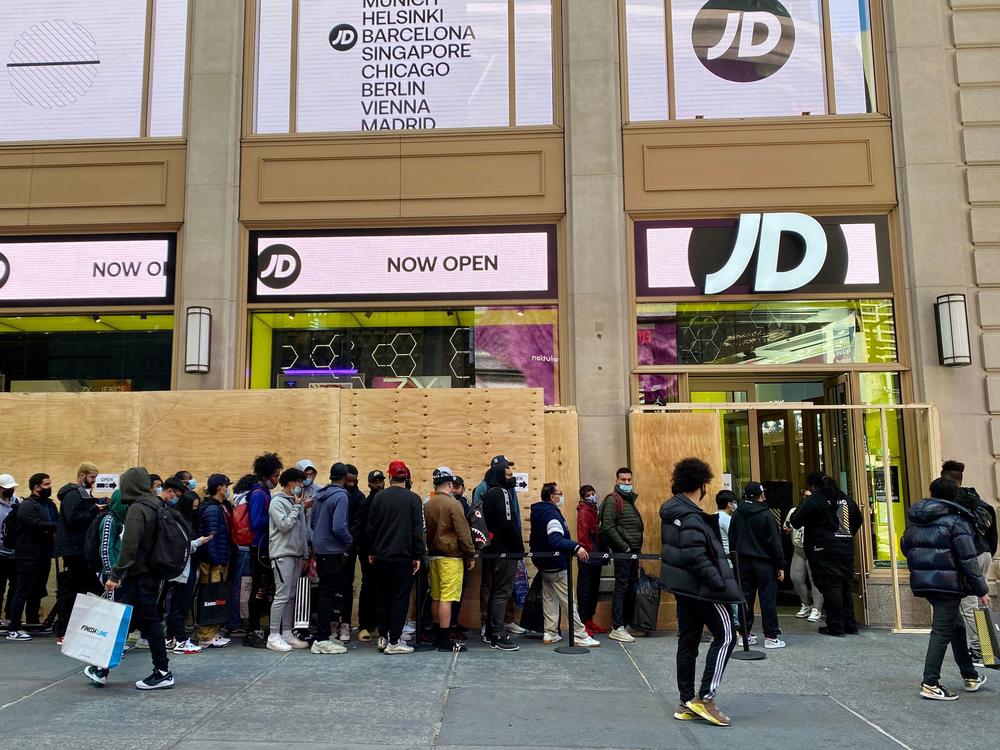Loading...
Section Branding
Header Content
Shoppers Snap Up Electronics, Aren't Splurging Elsewhere
Primary Content
Updated at 9:13 a.m. ET
Shoppers kept buying electronics and home improvement supplies, but October proved a month when much of the retail world held its breath. Retail sales barely budged, inching up just 0.3% from September, the Commerce Department said Tuesday.
Rebounding from near-collapse in the spring, retail spending has improved since the summer, even topping pre-pandemic levels. In October, overall retail sales were up 5.7% compared with a year earlier.
In recent months, shoppers even begun returning to beleaguered clothing and department stores but cut back on that shopping again last month. Here's where people were spending in October, compared with a month earlier:
- Online retailers: +3.1%
- Electronics stores: +1.2%
- Gas stations: +0.4%
- Home improvement and gardening stores: +0.9%
- Restaurants and bars: -0.1%
- Furniture stores: -0.4%
- Grocery stores: -0.4%
- Big-box stores: -1.1%
- Clothing and accessories stores: -4.2%
- Sports, music and other hobby stores: -4.2%
- Department stores: -4.6%
This is a pivotal report ahead of the all-important holiday shopping season. It comes at a time of many uncertainties for stores and restaurants. Recent surveys have painted a complicated picture of the 2020 holiday gift-buyer. Several say most shoppers plan to spend less this year overall, though may splurge more on decorations.
For the first time in decades, the National Retail Federation has delayed its holiday forecast. The group's October survey suggested shoppers would spend about $50 less this year compared with last year. The biggest change was people saying they would spend less on things beyond gifts, cutting back on that extra shopping they might typically do during holiday sales.
Two leading forecasts have predicted holiday sales to grow between 1% and 2% this year, compared with 4% gains in each of the past two years. Some shoppers have told surveys they're ready to spend the money they've saved up from not doing much during the shutdowns. But many others say they plan to avoid gatherings and to tighten their financial belts.
As of late October, more than 21 million people were collecting some form of unemployment relief, with more than half relying on emergency pandemic programs that were set to expire at the end of December.
Online and big-box stores selling food and household basics have been the retail winners of the pandemic, raking in profits and going on hiring sprees. Walmart on Tuesday reported its online sales jumped 79% in the latest quarter, continuing the strong growth of previous months. The retail giant said shoppers continued to make fewer purchases but spent more on each one.
Walmart's key rival Amazon last month reported yet another record-setting quarter, with sales topping $96 billion. Amazon CEO Jeff Bezos, in a statement, cited "more customers than ever shopping early for their holiday gifts."
Editor's note: Amazon and Walmart are among NPR's recent financial supporters.
Copyright 2020 NPR. To see more, visit https://www.npr.org.

